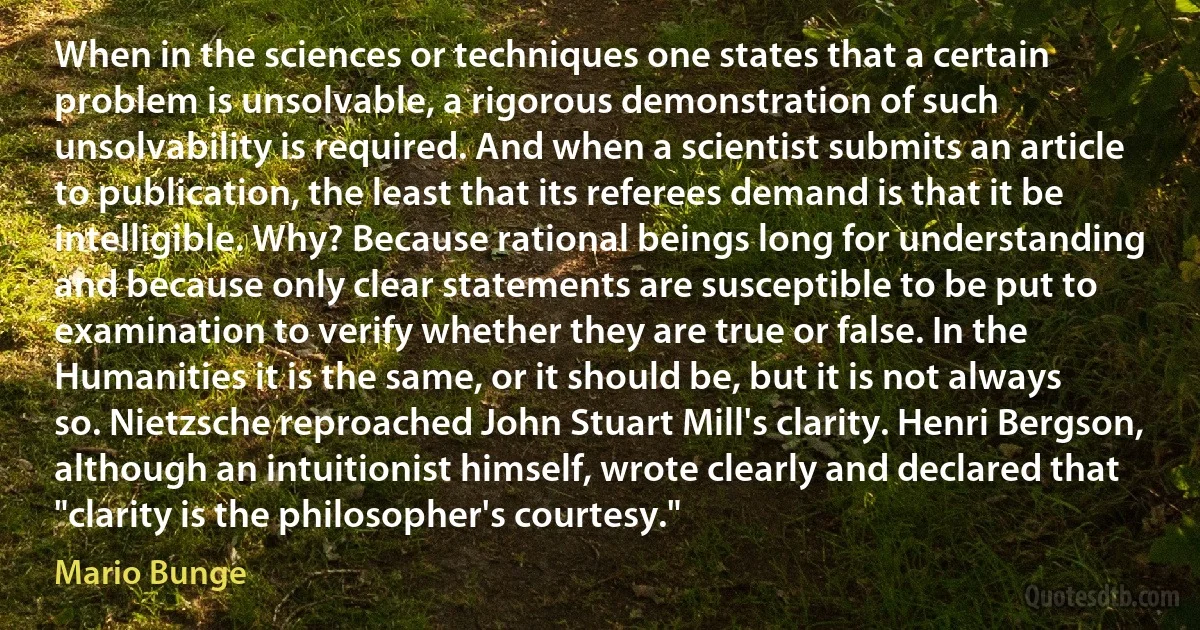
When in the sciences or techniques one states that a certain problem is unsolvable, a rigorous demonstration of such unsolvability is required. And when a scientist submits an article to publication, the least that its referees demand is that it be intelligible. Why? Because rational beings long for understanding and because only clear statements are susceptible to be put to examination to verify whether they are true or false. In the Humanities it is the same, or it should be, but it is not always so. Nietzsche reproached John Stuart Mill's clarity. Henri Bergson, although an intuitionist himself, wrote clearly and declared that "clarity is the philosopher's courtesy."
Mario BungeRelated topics
article certain clarity clear courtesy false humanities john least problem publication should susceptible understanding nietzsche unsolvable sciences statesRelated quotes
If there was anything, anything more at all, after this crazy mix-up we call living, I could feel that there might be some point to the whole frantic business, even if I did not know and could not know the full answer while I was alive.”
"And suppose there was not? Suppose that when a man's body disintegrates, he himself disappears absolutely. I'm bound to say I find it a probable hypothesis.”
"Well- It wouldn't be cheerful knowledge, but it would be better than not knowing. You could plan your life rationally, at least. A man might even be able to get a certain amount of satisfaction in planning things better for the future, after he's gone. A vicarious pleasure in the anticipation.

Robert A. Heinlein
Do I worship modern medicine? Is science my religion? Not at all; there is no aspect of modern medicine or science that I would exempt from the most rigorous scrutiny, and I can readily identify a host of serious problems that still need to be fixed. That's easy to do, of course, because the worlds of medicine and science are already engaged in the most obsessive, intensive, and humble self-assessments yet known to human institutions, and they regularly make public the results of their self-examinations. Moreover, this open-ended rational criticism, imperfect as it is, is the secret of the astounding success of these human enterprises. There are measurable improvements every day.

Daniel Dennett
But she [Virginia Woolf] is impotently distant from an understanding of the proper relations between literature and society, because she has no clear sense of the functions of literature. She sees writers as individual 'artists' working in mysterious privacy - which from time to time society rudely invades. Her writer, indeed, has all the characteristics of traditional 'femininity' - with society as the big strong male who should protect and cherish his literary womenfolk, but does not. She might - for all the application of her complaint to the relations between society and literature - be talking of the relations between husbands and wives.

Laura Riding
Classical science in its diverse disciplines, be it chemistry, biology, psychology or the social sciences, tried to isolate the elements of the observed universe - chemical compounds and enzymes, cells, elementary sensations, freely competing individuals, what not -- expecting that, by putting them together again, conceptually or experimentally, the whole or system - cell, mind, society - would result and be intelligible. Now we have learned that for an understanding not only the elements but their interrelations as well are required: say, the interplay of enzymes in a cell, of many mental processes conscious and unconscious, the structure and dynamics of social systems and the like.

Ludwig von Bertalanffy
In western society, there is a problem similar to India that the income of a research scientist is less than that of a management person. But perhaps the facilities and the infrastructure being much advanced in the western universities, they are able to attract and retain the people. In our case this can happen but not to the extent we would like. A corrective measure to some extent has been taken by the establishment of the Indian Institutes of Science Education and Research (IISERs). They are doing for pure sciences what IIT's do for applied sciences. Since they are attracting good talent it may happen that you will have more input in research in the next ten years.

Jayant Narlikar
